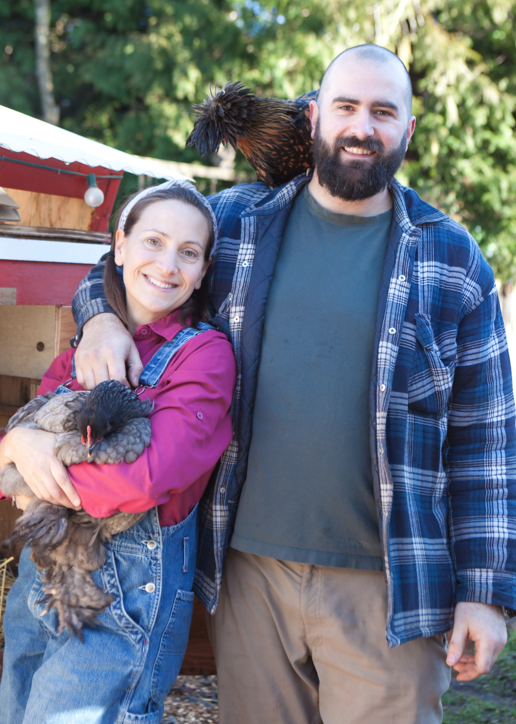
My son gave me a sign he had hand carved for Christmas. “Dog Gone Farm,” it reads, in jaunty red letters (inspired by our fence jumping dog). With the sign hung proudly on the front door, it was official. We were farmers. We grow fruits and vegetables, build soil, and raise chickens which wouldn't be unusual if it weren't for the fact that we do all this in the middle of the city. We have joined a small but growing number of urban farmers who are working to produce healthier food in a more sustainable way that builds community resilience and we're having a great time doing it.
Our property already had several fruit trees on it when we moved in and we learned from the neighbours that the former owners had been passionate gardeners. Neither of us had any gardening experience but a couple of years after we moved in, we shared the yard with a neighbour who didn't have a garden of her own. She taught us a lot and we grew a little bit of corn, carrots and some tomatoes. Turns out that these were only gateway drugs as by the end of the summer we were completely hooked.
Our kitchen was already overflowing with tomato seedlings last spring when I first caught wind of the proposed backyard chicken bylaw for the City of Vancouver. There was a chapter on chickens in The Urban Homestead (the book that was quickly becoming our bible) which I promptly devoured. Turns out, chickens are a great addition to a backyard garden. They provide fresh eggs every day, wonderfully nutrient rich fertilizer, and are voracious hunters of slugs and other garden pests. So it was for all the most practical reasons in the world that we became backyard chicken farmers.
No one was more surprised than me to discover how truly fond I would become of these feathered dinosaur cousins (chickens are the nearest living relative to the T-Rex!). They each have their own unique personality and I was soon enjoying my coffee with them in the garden most mornings. They did indeed provide all the practical benefits promised in my handy dandy guide to urban farming but there was so much more to them! Neighbourhood children (often with parents in tow) were lining up at our gate to come in and see the chickens. We met more of our neighbours last summer than we had in the 3 previous years we'd lived here.
The summer of 2010 turned out to be a hard one for food production. The torrential rains at the end of August wiped out our entire tomato crop, and the corn I had planted too late (after the chickens devoured the first planting's sprouts) was disappointing but we had a bumper crop of beans, loganberries, zucchini, lettuce, Swiss chard, carrots and a delightful herb garden. By the time we started to feel like we were getting the hang of things, it was Thanksgiving.
The turkey was the best any of us had ever tasted. We spent Thanksgiving with our new urban farmer friends from the neighbourhood . It seemed only fitting that we would spend this celebration of the harvest with the people we had grown food and learned about chickens with. We picked up an organic 30lb heritage turkey from a local farmer and cooked up all the bounty from our respective backyard gardens. We reminisced about the tomato massacre, cracked bad poultry jokes and plotted new and adventurous ways to expand our local food experiences, not the least of which was to include going into the egg business together.
Over the summer, we had discovered one of the city's best kept secrets. There is an organic, heritage farm hidden in North Richmond just under the Oak Street Bridge. We became fast friends with the young farmer and quickly learned that he was losing the battle with the coddling moth who were destroying 90% of his apple crop. I asked him if he had thought about getting some chickens. Chickens and orchards often go hand in hand as chickens do double duty as pest control and fertilizers. He said that he just didn't have time to do chickens but wished that someone who wanted to do chickens would come keep them in his orchard. So it wasn't long before we'd constructed a chicken coop and acquired a flock of heritage laying hens (and 5 turkeys for Christmas!). We sell the eggs on my front porch and now have a very loyal (some claim to be addicted to our eggs) local customer base.
The turkey was delicious and by January, preparations had already begun for our Urban Farm 2.0. We bought a new greenhouse and began construction on several new raised beds. We set up an aquaponics system in our basement (hydroponics meets aquaculture) so we can grow food year round and began scouting for opportunities to expand our farm. We were able to find another 3 acres in Richmond so we built another greenhouse and started seeding.
Now that spring is finally here, our greenhouses are bursting at the seams and our outdoor beds are bursting to life. Bees and rabbits have been added to the list of inhabitants at our urban farm. We have tables booked at 3 local farmers markets and are getting more and more involved in our neighbourhood and the local urban agriculture movement. In our efforts to become self-sufficient, we've become part of a community. Nothing really brings people together like food... especially when that food was grown locally!
Julia Smith
Vancouver Urban Farmer




